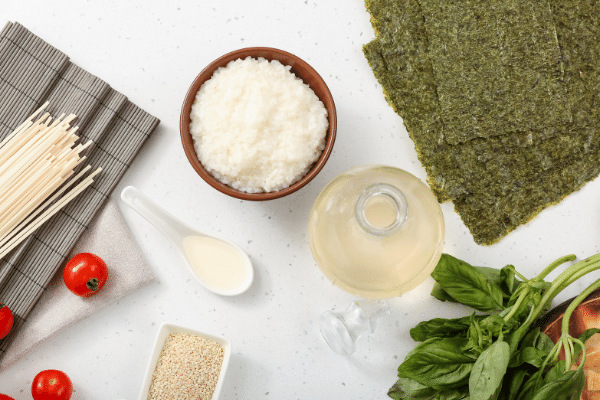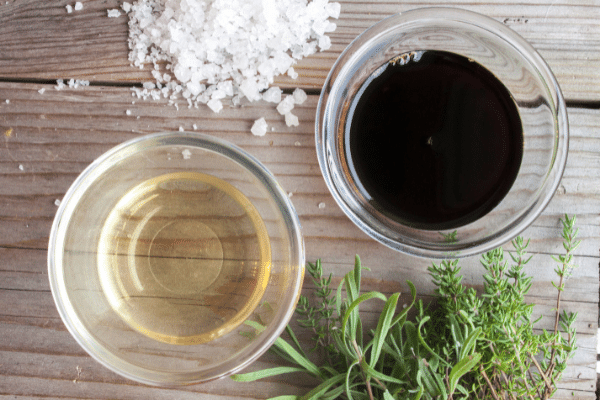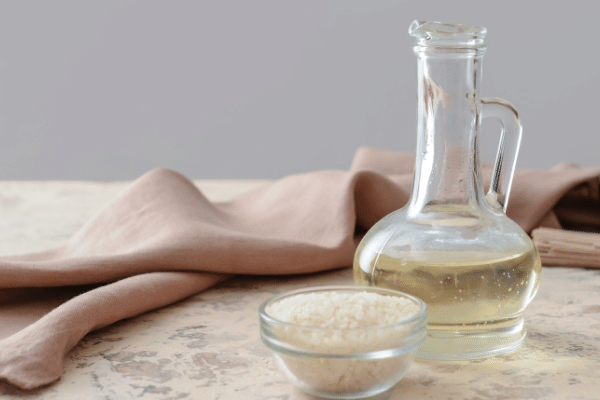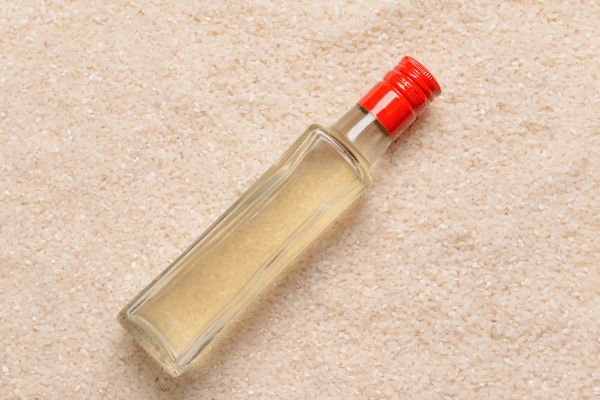
Unlike other popular varieties of vinegar, Rice Vinegar is not a commonly used ingredient in dishes. So, you probably bought a bottle of Rice Vinegar because a recipe demanded it in the past, but now the bottle is lying dormant at the end of your kitchen pantry. This might raise questions like, “Does rice vinegar go bad?”
Even though rice vinegar doesn’t go bad quickly, it is best to stay prepared for the worst-case scenarios. Moreover, improper storage techniques can make your rice vinegar go bad fast.
Read ahead and learn more about rice vinegar’s shelf life and storage methods. In addition to that, we shall also learn the determinants that can help you distinguish good rice vinegar from the one that has gone bad.
How Long Does Rice Vinegar Last?
Rice Vinegar has an indefinite shelf-life. It means the vinegar tends to last for years, provided it is stored properly. Like other types of vinegar, it doesn’t have any exact shelf life. Some brands print the best-before date on the label, but you can still use it past its use-by date.
Since Rice Vinegar is made out of fermented rice, it is less acidic and has a slightly sweet taste than other varieties. It tends to last for years after the printed use-by date. Rice Vinegar is less acidic, and hence it lacks in sustaining its authentic flavor longer. After a prolonged storage period, say for five years, you may notice a change in the flavor.
So, if you want to preserve the Rice Vinegar for longer than five years, it is best to store it in a fridge.
How long does Rice Vinegar last after opening? How long does Rice Vinegar last if unopened?
The following table will help you determine the tentative time period through which your rice vinegar will retain its quality, whether it is opened or unopened.
| Items | Pantry | Fridge |
| Unopened and Opened Rice Vinegar | Above Five years | Above Ten years |
Please note that these periods are for the best quality only. Rice Vinegar lasts indefinitely without going bad quickly.
How do you know if Rice Vinegar is bad?

After opening the bottle of Rice Vinegar, it tends to lose some of its freshness. But it doesn’t mean that the vinegar has gone bad. Three important signs can help you evaluate the freshness of the Rice Vinegar, the smell, color, and growth of the mother.
The Color
Rice Vinegar is not a commonly used ingredient like other popular vinegar varieties. So, it is probably stored close to the stove. If your Rice Vinegar is excessively exposed to heat sources, it tends to lose its color.
Fresh Rice Vinegar has a naturally pale color, and when it is exposed to heat sources, the color changes, and it may get murky. Rice Vinegar comes in different shades of brown and red. But, when you notice any color changes, it means the vinegar has started to spoil.
Smell and Taste
As mentioned, Rice Vinegar has a slightly sweet flavor and taste. So, if your Rice Vinegar lacks the sweet smell and taste, it means the vinegar has started losing its freshness.
You must taste the Rice Vinegar to see if it has the same authentic sweet taste or if it has changed.
Growth of Mother
It is common to see a mother’s growth inside your Rice Vinegar. Mother in Vinegar is not harmful, and it won’t make you sick or hamper the shelf-life of the Rice Vinegar. The presence of the mother only confirms that the vinegar has been opened and used.
It is very time-consuming to get rid of the mother. You may use a filter to remove the mother from the vinegar before using it.
What happens if you eat bad Rice Vinegar?

Rice Vinegar lasts indefinitely, and it won’t go bad or make you sick if you consume it after the best-before date printed on the label. Since Rice Vinegar has high acidic content, it is self-preserving and won’t experience mold growth.
After a prolonged period of storage, you may see the growth of Mother in the vinegar. You must not consume it. Mother is not harmful, and it won’t make you sick. But, it is best to remove Mother before using the vinegar.
Because of the high acidic content, there is less chance of mold growth in the Rice Vinegar. So, consuming old Rice Vinegar won’t make you sick. You may experience a slight taste and flavor change which is okay with old Rice Vinegar.
Can You Freeze Rice Vinegar? Refrigerated Vs. Shelf-Stable

It is perfectly safe to freeze your Rice Vinegar, but it is not needed to preserve it. So, freezing Rice Vinegar is not suggested because the extremely cold temperature of a freezer may affect the flavor and taste of the vinegar.
You will not like the distinct flavor and taste of the Rice Vinegar after thawing it. But, if you still want to freeze your Rice Vinegar, keep the following pointers in mind.
- You must freeze the Rice Vinegar in a freezer-friendly container. It must be a plastic airtight container and avoid storing it in a glass. Liquids expand when frozen at extreme temperatures and may explode in the glass container.
- Apply plastic wrap on the lid and seal the jar tightly. The plastic wrap ensures that the lid is secured tightly, and it adds an extra layer of safety to the bottle.
- Leave the frozen Rice Vinegar in a refrigerator overnight before thawing it.
How long does Rice Vinegar last in the refrigerator?
Refrigerating Rice Vinegar is not always needed as it is shelf-stable and can keep its quality when stored properly in the pantry. However, refrigerating the Rice Vinegar will extend its shelf-life and sustain the peak flavor and quality of the vinegar past its use-by date.
As your Rice Vinegar approaches its use-by date, you must transfer the bottle to a fridge for prolonged storage. You don’t have to transfer the Rice Vinegar to another container as you can refrigerate it in the original container.
But, you need to ensure that it is stored well-sealed and tightly to extend the shelf-life.
How long does Rice Vinegar last if not refrigerated?
Whether unopened or opened, Rice Vinegar is a shelf-stable product, and it can be stored safely in the pantry at room temperature. The vinegar has high acidic content, and hence it won’t go bad and remains self-preserving.
So, there is no harm in storing the vinegar in your pantry or kitchen cabinet even after opening it. However, it is suggested to transfer the bottle to a fridge for best results, especially when the Rice Vinegar approaches its use-by date. It will help the Rice Vinegar to extend its shelf-life.
How to Store Rice Vinegar?

To get the most out of your Rice Vinegar, it is necessary to store it correctly. Proper storage conditions ensure that it won’t go bad quickly. Rice Vinegar can lose its freshness and quality if not stored as recommended. So, if you want to extend its shelf-life, follow these storage tips.
Use Airtight Container
You have two options to store the opened Rice Vinegar. You may store the Rice Vinegar in the original bottle with the lid securely sealed. You may transfer the vinegar into an airtight container.
Keeping the vinegar in the original package is best to sustain its freshness and quality.
Store in Cool and Dry Places
Rice Vinegar tends to lose its freshness and quality when exposed to heat sources for prolonged periods. So, avoid keeping the bottle of Rice Vinegar close to your stove or under direct sunlight.
You must choose a spot in your pantry or kitchen cabinet away from heat sources. It must be a cool and dry spot to offer the best storage conditions for the Rice Vinegar.
Use Freezer Bags
If you want to preserve your Rice Vinegar indefinitely, you must store it in a freezer, and for best storage conditions, you must use freezer bags. You have to use a freezer-friendly bag to freeze the Rice Vinegar in a freezer and, if possible, store it in small cubes to avoid thawing the entire Rice Vinegar.
What are the Alternatives to Rice Vinegar if it has gone bad?
Recreate the sweet and acidic taste of rice vinegar with the following substitutes in case the one in your kitchen has gone bad:
- Lime Juice
- Lemon Juice
- Apple Cider Vinegar
- Distilled White Vinegar
- White Balsamic Vinegar
Frequently Asked Questions
Does every Rice Vinegar spoil?
The commercially prepared and packaged Rice Vinegar never spoils or goes bad. However, the flavor and appearance of the Rice Vinegar deteriorate with time. The bottle of Rice Vinegar comes with a use-by date printed on it, and it only tells how long it keeps its quality and freshness. After the use-by date, the Rice Vinegar remains safe for consumption, and it won’t make you sick.
My Rice Vinegar is Getting Cloudy – Is It Safe and Edible?
Yes, cloudy Rice Vinegar is safe for consumption, provided that it has no spoilage signs mentioned above. With time, Rice Vinegar may get cloudy because of the Mother’s growth in the vinegar. It is not harmful and won’t make you sick. However, removing it before using the vinegar is necessary. So, use a filter to remove the Mother and use the rest of the vinegar without worrying.
How long does homemade Rice Vinegar last?
Fresh homemade rice vinegar will only last for a couple of months- mostly 3 to 4 since it does not contain any preservatives. The way is to prepare rice vinegar in small batches so that you can use it before it goes bad.
Does Nakano rice vinegar need to be refrigerated?
As long as the Nakano rice vinegar is unopened, you can place it in the pantry in a dry place, preferably away from direct sunlight. Refrigerate it as soon as you open the bottle.
What is floating in my rice vinegar?
Do not panic if you see something floating in your rice vinegar since it is nothing but mother, the natural bacteria. Usually, this occurs when you leave rice vinegar unopened without storing it accurately. You can either filter it out or consume it as it is, as it will not harm your health.
Can you eat Rice Vinegar after the expiration date?
Rice vinegar lasts for years after the expiration date. Unless you notice a foul smell or mold appearance, you can consume rice vinegar without worrying about any health consequences.
The Bottom Line
To conclude, it is worth mentioning that Rice Vinegar can go bad, but it has a long window of time before it goes bad. Rice Vinegar has a shelf-life of up to five years post-production, and if you store it in a fridge, it tends to last indefinitely.
Ensure to store the Rice Vinegar in cool and dry places with the lid tightly sealed. Take a moment to check for the spoilage signs before using it, and if you see the presence of Mother, remove it before using the old Rice Vinegar.
You don’t have to worry about its shelf-life when you love using Rice Vinegar in cooking.



